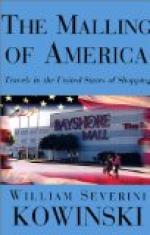“Because no people can be happy, if abridged of the freedom of their consciences, as to their religious professions and worship; I do grant and declare, that no person inhabiting this province, or territories, who shall acknowledge one Almighty God, the Creator, Ruler, and Upholder of the world, and live quietly under the civil government, shall in any case be molested, or prejudiced in his person or estate because of his conscientious persuasion or practice.”
But to return to New England; happily for these states, the revolution has done away great part of the severity of their ancient laws; but the inhabitants still retain a taste for scriptural phrases and allusions in their writings. As you are fond of poetry, I send you two specimens of this kind of writing; the first is from a tomb-stone at Plymouth[Footnote: The oldest settlement north of Virginia.]. It was written by one of the first settlers, and is in the true spirit of those times.—
EPITAPH UPON GENERAL ATHERTON.
“Here lies our captain, and major,
Of Suffolk was withal,
A godly magistrate was he,
And major general.
Two troops of horse came here,
(Such love his worth did crave;)
Ten companies of foot also,
Mourning, marched to his grave.
Let all that read be sure to keep
The faith, as he has done.
He lives now crowned with Christ;
His name was Humphrey Atherton.”
In order to understand the second, I must inform you, it is usual for boys, who expect christmas boxes, to present their masters’ customers with a copy of verses, expressive of their good wishes, &c. The call-boy of the theatre, (a mechanic’s son of this town,) had the following verses written in the usual style by the poet commonly employed on these occasions, and when printed, delivered one to each of the performers.—
“THE CALL-BOY OF THE THEATRE,
FEDERAL-STREET,
NEW YEAR’S WISH, 1797.
“Look up, worthy friends, from yonder bright
hills
See how Phoebus smiles, to hail the new
year:
I bring you a tribute—rejoice thus to find,
So many are living, and meet with us here.
“May health be confirm’d, and sickness
remov’d;
May no sweeping flames take place in this
state;
We sympathise deeply with neighbouring friends,
Whose cup has run over with this bitter
fate.
“May teachers this day find help from
above
To publish glad news, as heralds of
grace,
While Zion is mourning her light shall break
forth,
And shadows of midnight away from her
chase.
“I wish through this year God’s presence
may smile
On all your just schemes at home or abroad;
I wish you his protection, by sea or by land;
May your theatrical works find
favour in God.
[Footnote: The boy must surely mean the gods.]




